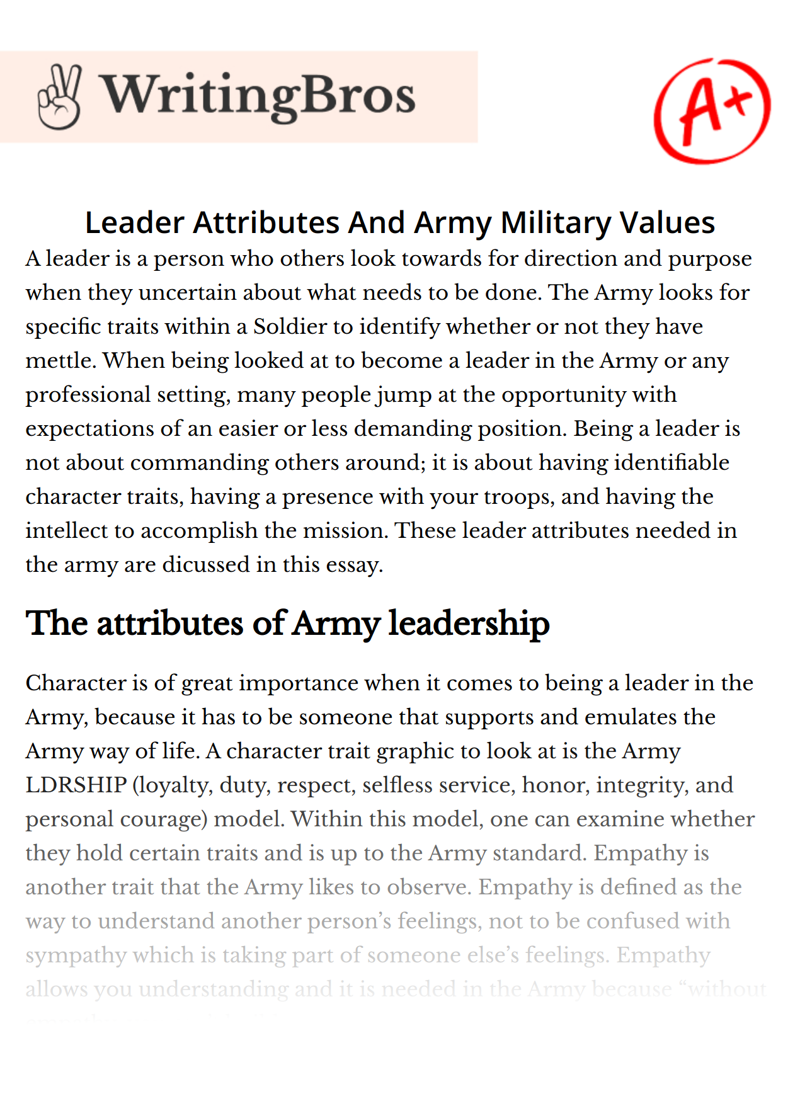Leader Attributes And Army Military Values

A leader is a person who others look towards for direction and purpose when they uncertain about what needs to be done. The Army looks for specific traits within a Soldier to identify whether or not they have mettle. When being looked at to become a leader in the Army or any professional setting, many people jump at the opportunity with expectations of an easier or less demanding position. Being a leader is not about commanding others around; it is about having identifiable character traits, having a presence with your troops, and having the intellect to accomplish the mission. These leader attributes needed in the army are dicussed in this essay.
The attributes of Army leadership
Character is of great importance when it comes to being a leader in the Army, because it has to be someone that supports and emulates the Army way of life. A character trait graphic to look at is the Army LDRSHIP (loyalty, duty, respect, selfless service, honor, integrity, and personal courage) model. Within this model, one can examine whether they hold certain traits and is up to the Army standard. Empathy is another trait that the Army likes to observe. Empathy is defined as the way to understand another person’s feelings, not to be confused with sympathy which is taking part of someone else’s feelings. Empathy allows you understanding and it is needed in the Army because “without empathy, you can’t build a team or nurture a new generation of leaders” (Gourguechon, 2017). A strong sense of ethics helps identify good leaders within the organization as well as help lead in a manner that respect the rights and dignity of others. They will lead themselves to overcome obstacles so they can lead others within the organization towards success on a much larger scale.
Presence with your troops is the second trait that Army will observe and watch for in potential leaders. As a leader, they are the most seen and the most watched individual by lower enlisted Soldiers. They have an ever-lasting impression on the lower enlisted as they are constantly around them and the way they work or interact with others will transfer to subordinates. A leader should never ask a Soldier to do a task that he or she will not do themselves. A leader who will not do as such, is incompetent and is not ready for the responsibility of shaping the next generation of leaders. Leaders should at all times conduct themselves and be an example of military and professional bearing. Military and professional bearing are great examples of a “professional image of authority” (Headquarters, Department of the Army, 2012).
Leaders are the decision makers and the brains behind the missions, with this, comes the requirement of having the intellect to give clear commands. Leaders need to be able to analyze and identify where they have strengths and weaknesses. With the capability of being able to step back because they are not subject matter experts will exponentially increase the thought process of the information. Mental agility is another observable trait Soldiers and senior leaders will look at and examine. The ability to adapt to mission tasks and unit requirements will speak volumes. “Mental agility provides organizations with operational adaptability to develop situational understanding to seize, retain, and exploit the initiative” (Headquarters, Department of the Army, 2012).
A leader being able to think critically, and to keep an open mind to any number of solutions is detrimental to the accomplishment of the mission without putting Soldiers at risk. Mental agility flows into the MDMP (Military Decision Making Process) and the military problem solving process. Competent leaders will be able to ask the right questions and are not afraid to learn from the mistakes from others prior to themselves. Critically thinking upcoming leaders will learn and be influenced to think out of the box and show innovation. Innovation is a major point in leadership as it shows the “ability of being able to introduce a new theory when needed or as the opportunities arise” (Headquarters, Department of the Army, 2012). Leaders from all over the branches of service need to be able to be multi-purpose and completely flexible when a problem occurs and it needs a solid solution within a timely manner.
Potential leaders will be evaluated and tested time after time; even after they solidify their position. The attributes stated are the primary and most noticeable traits that a leader could possibly hold. Every attribute needs to observed and tested just so that the leader does not lose sight of why they hold that position. As upcoming leaders start being evaluated, they start growing and learning from those leaders who want to see them succeed within the organization. Leaders are only as strong and successful as the weakest and newest member of their team. The Army is an excellent example of how diverse personality traits and attributes blend together to create the most effective force in the world.
References
- U.S. Army. (2019). Army Doctrine Publication 6-22: Army Leadership and the Profession. https://armypubs.army.mil/epubs/DR_pubs/DR_a/pdf/web/ARN20301_ADP%206-22%20C1%20FINAL%20WEB.pdf
- U.S. Army. (2020). The Army Ethic. https://www.army.mil/e2/downloads/rv7/ethics/docs/the%20army%20ethic.pdf
- Army University Press. (2018). Army Doctrine Reference Publication 6-0: Mission Command. https://www.armyupress.army.mil/Portals/7/adrp/ADRP_6-0.pdf
- U.S. Army. (2021). Army Values. https://www.army.mil/values/
- Smith, P. J., & Wellman, N. (2018). Moral Leadership and Ethical Decision Making: Implications for Military Leaders. Journal of Military Ethics, 17(3-4), 191-204. https://doi.org/10.1080/15027570.2018.1555853
- Department of Defense. (2021). DoD Dictionary of Military and Associated Terms. https://www.jcs.mil/Portals/36/Documents/Doctrine/pubs/dictionary.pdf
- U.S. Army. (2021). Army Leadership. https://www.army.mil/leadership/
- Linch, K. (2020). The Intersection of Military Leadership and Ethical Decision Making. Small Wars Journal, 16(2), 26-40. https://smallwarsjournal.com/jrnl/art/intersection-military-leadership-and-ethical-decision-making
- Wong, L. S., & Gerras, S. J. (2015). Enhancing ethical decision-making in the military. In Ethical Decision Making in the Military (pp. 1-22). Routledge.
- United States Military Academy. (n.d.). Character and Leadership Development. https://www.westpoint.edu/academics/centers-and-research/character-and-leadership-development
Cite this Essay
To export a reference to this article please select a referencing style below

